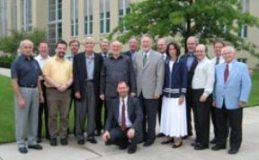Theologians representing the Seventh-day Adventist Church (SDA) and the World Evangelical Alliance (WEA) met August 5 to 10 at Andrews University in Berrien Springs, Michigan (USA) for their second round of theological conversation on world-level.
The result of this dialogue between the Seventh-day Adventist Church and the World Evangelical has been the development of the joint statement identifying the common goals and results of theological discussions between the two institutions, delegates from both organizations. The full text of the joint WEA-SDA statement has been published on September 1.
"We were able to share with the evangelical world the Adventist self-understanding in an effort to eliminate prejudice and clarify questions about our message," said meeting organizer John Graz, secretary of the Council on Interfaith Relations of the Seventh-day Adventist Church (CIRA).
"Instead of knowing about us through questionable means, this allowed us face-to-face interaction to share where our church stands," he said.
The two institutions shared a "large measure of theological agreement," said Angel Rodriguez, director of the Adventist Church's Biblical Research Institute. The discussions were led by Rolf Hille, chairman of the Theological Commission of the WEA, and William G. Johnsson, assistant to the president of the General Conference of Seventh-day Adventists for Interfaith Relations.
The conversations followed an initial round of discussions between the two organizations held in Prague, Czech Republic, in August, 2006.
"Each denomination [in the WEA] has its own distinctive identity; it's not their goal to diminish the differences, but acknowledge them and respect them," Rodriguez said.
Adventist participants agreed with the WEA Statement of Faith, which focuses on the Bible as the Word of God, the Trinity, the person of Jesus Christ and his saving work, justification by faith, prayer, conversion, sanctification, and the Second Coming of Christ.
According to the release several areas of disagreement became apparent between the two organizations regarding Adventist teachings including pre-Advent judgment, the role and authority of Ellen G. White, and the Sabbath as the day of worship for Christians.
However, participants concluded that common issues would allow Adventists and the WEA to cooperate on common issues, such as Bible Society work, Bible study and religious liberty, Graz said.
The WEA represents some 420 million Evangelical Christians from different denominations in 128 countries. The Adventist Church has 15 million members in more than 200 countries.
The Protestant mainstream Seventh-day Adventist Church, a Christian World Communion, has more than 15 million members and 25 worshippers in 202 countries.

